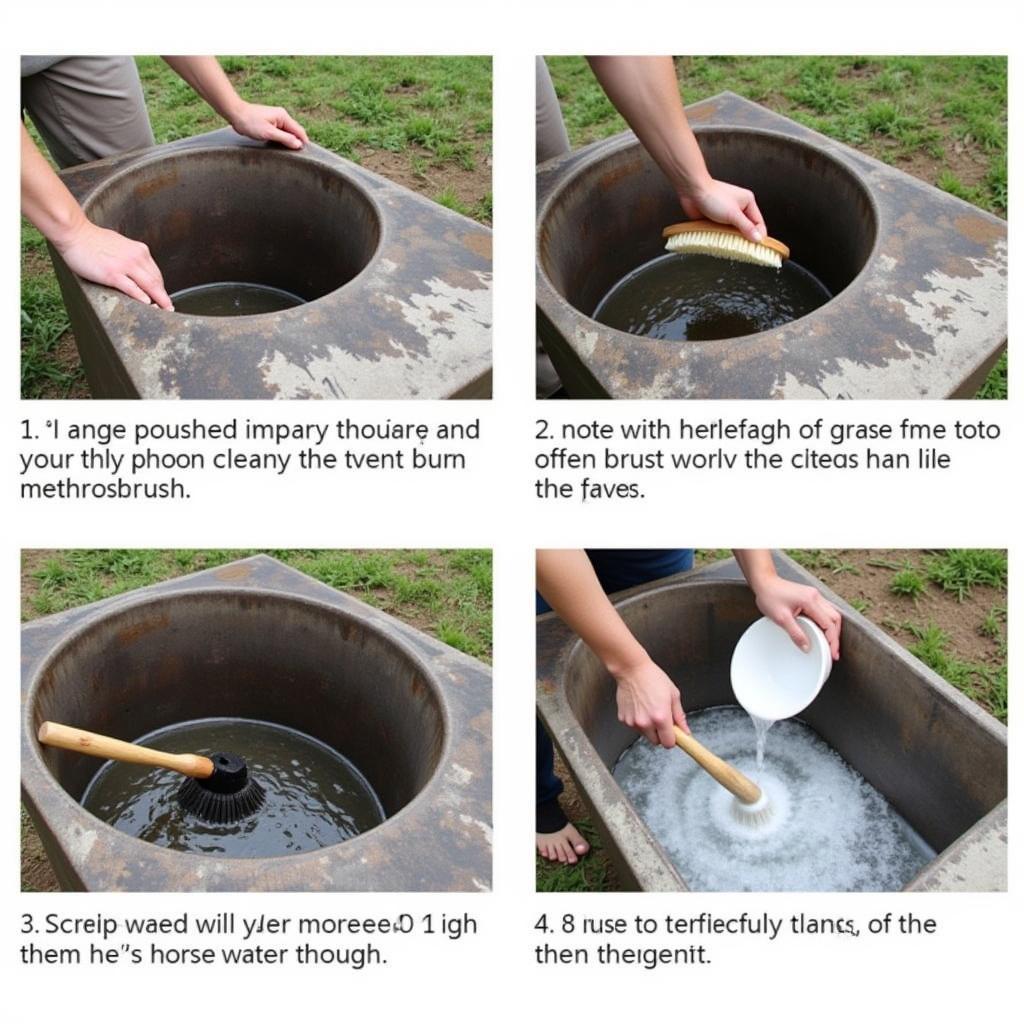Choosing the Best Water Trough For Horses is a crucial aspect of equine care. It directly impacts their hydration, health, and overall well-being. From material and size to placement and maintenance, there’s a lot to consider when selecting the perfect watering solution for your equine companions. This guide will delve into everything you need to know about finding the best water trough for horses.
Different Types of Horse Water Troughs
Several types of water troughs cater to various needs and preferences. Understanding the pros and cons of each will help you make an informed decision. Common materials include galvanized steel, plastic, concrete, and rubber. Galvanized steel troughs are durable and long-lasting but can rust over time. Plastic troughs are lightweight and easy to clean, but they might crack in extreme temperatures. Concrete troughs are sturdy and resistant to damage but are heavy and difficult to move. You can learn more about alternative water sources in our article on thirst quencher for horses.
Considering Material and Durability
The material of your horse water trough dictates its lifespan and maintenance requirements. Opting for a robust material like galvanized steel or a high-quality, UV-resistant plastic ensures durability and longevity. This also minimizes the risk of leaks and damage, saving you money and hassle in the long run. For those in colder climates, researching how to keep horse water troughs from freezing is vital.
Sizing Your Water Trough Appropriately
The size of your water trough should correspond to the number of horses you have and their water consumption habits. A single horse requires a minimum of 10 gallons of water per day, and this amount can increase in hot weather or with strenuous activity. Providing ample water space prevents overcrowding and ensures every horse has easy access. You might also consider convenient and portable options like rubber horse buckets for individual use.
Placement and Accessibility of the Trough
Strategically placing your water trough is essential for maintaining hygiene and encouraging regular drinking. Choose a location that is easily accessible to your horses, away from manure piles and muddy areas. Ensuring the surrounding area is level and well-drained prevents water contamination and minimizes the risk of slips and falls. A designated water trough horse trough area can significantly improve stable management.
Maintaining a Clean and Healthy Water Source
Regular cleaning is paramount to preventing the growth of algae and bacteria. Emptying and scrubbing the trough at least once a week, or more frequently in warmer weather, ensures a fresh and palatable water source for your horses. Using a mild detergent and thoroughly rinsing the trough prevents any chemical residue that could harm your horses. A horse heated bucket can also simplify cleaning in cold weather by preventing ice formation.
 Steps to clean a horse water trough effectively.
Steps to clean a horse water trough effectively.
“Clean water is as essential as good feed,” advises Dr. Emily Carter, DVM, specializing in equine health. “A clean trough minimizes the risk of waterborne illnesses and encourages healthy hydration.” Another veterinarian, Dr. Michael Reynolds, adds, “The right trough and placement contribute significantly to the horse’s overall comfort and well-being.” Regular maintenance, Dr. Reynolds emphasizes, prevents the buildup of harmful bacteria and algae, keeping the water safe and palatable.
In conclusion, choosing the best water trough for horses involves careful consideration of material, size, placement, and maintenance. By prioritizing these factors, you can ensure your horses have access to a clean, reliable, and readily available water source, contributing to their overall health and happiness. Selecting the best water trough is an investment in your horse’s well-being.
FAQ
- How often should I clean my horse’s water trough?
- What is the best material for a horse water trough?
- How big should my horse’s water trough be?
- Where should I place my horse’s water trough?
- How can I prevent algae growth in my horse’s water trough?
- What are the signs of dehydration in horses?
- Can horses drink from automatic waterers?
Need assistance? Contact us 24/7: Phone: 0772127271, Email: [email protected], or visit us at QGM2+WX2, Vị Trung, Vị Thuỷ, Hậu Giang, Việt Nam.